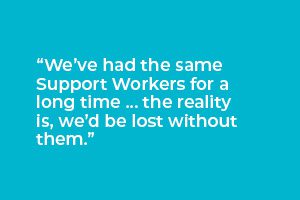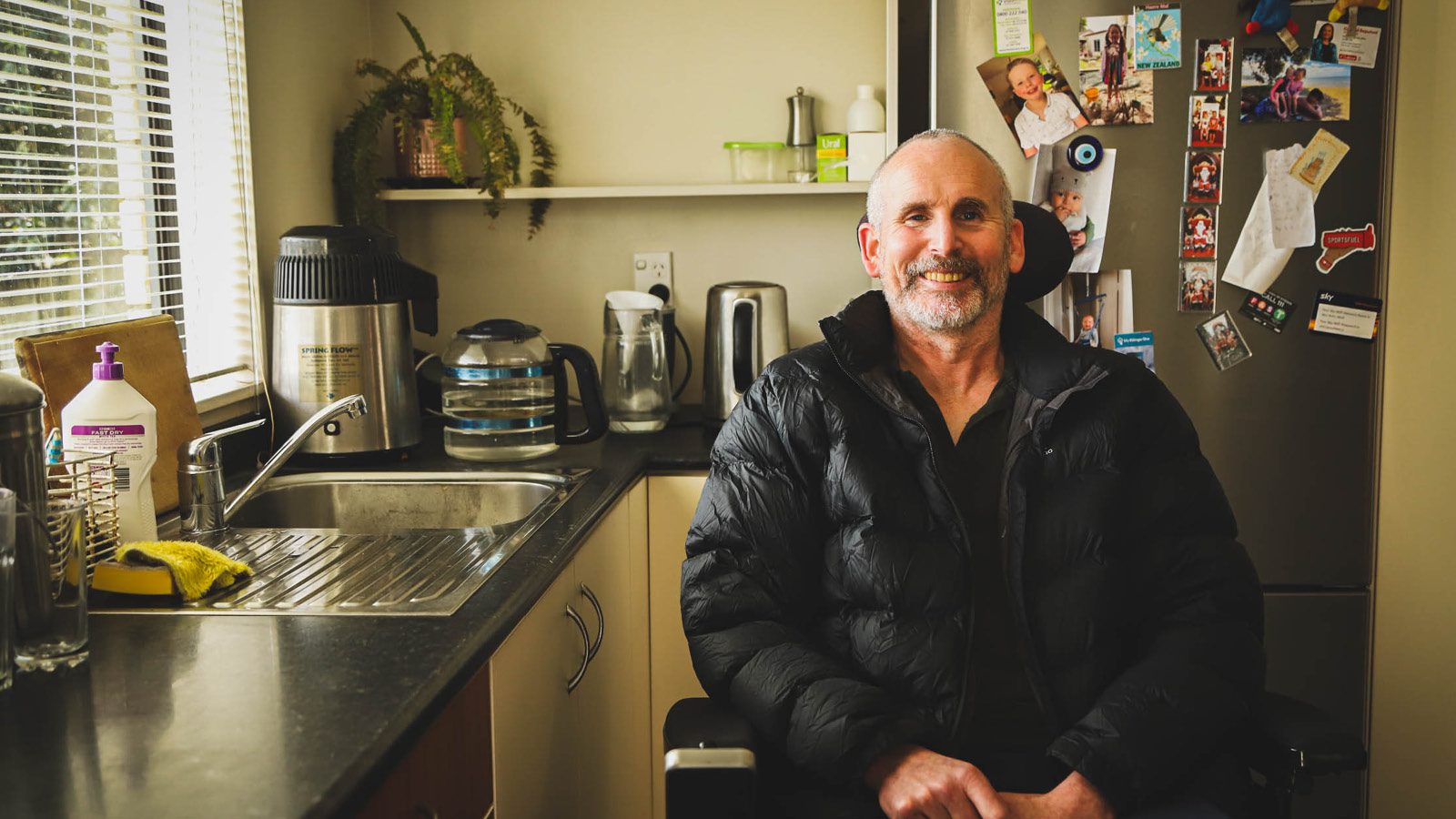Cameron enjoyed running, rock climbing and kayaking. He worked in a vineyard and loved the outdoors. Relaxation for Cameron and his mates was a jog through the Waitākere Ranges, along Scenic Drive to Karekare and then down the beach to the lighthouse at Whatipū and back home. Then, in 2007, he was diagnosed with multiple sclerosis. As his ability to walk was increasingly affected, he went from using a walking stick, to crutches, to a walking frame and now a motorised wheelchair.
Hear Cameron talk about his story.
I have an antique clock that my great-grandfather won in a running race over a hundred years ago. I guess it’s in my blood because I loved running too. The diagnosis in 2007 changed everything. It’s not just walking that I find difficult now. Multiple sclerosis affects the entire body which means a lot of things I once did without thinking are no longer possible. Some, like cooking and other kitchen tasks, are dangerous. I just don’t trust myself with a hot frying pan or boiling a kettle and, in the past, I’ve ended up with burns on my arms.
I’m not able to vacuum or clean and things like that either. I even need help showering and dressing.
Cameron and Visionwest Home Healthcare
 Cameron reached out to Visionwest Home Healthcare for support and goes on to explain how vital that help is for him and his wife, who also lives with multiple sclerosis. A Visionwest Home Healthcare Support Worker visits their home twice a day, seven days a week.
Cameron reached out to Visionwest Home Healthcare for support and goes on to explain how vital that help is for him and his wife, who also lives with multiple sclerosis. A Visionwest Home Healthcare Support Worker visits their home twice a day, seven days a week.
It’s those daily tasks that most people take for granted that can be a real mission for people like me. For instance, if I was left to do it on my own, it would take me three or four hours to shower and dress myself. That means, without our Support Worker, who can help us to do it in about 30 minutes, our entire life would become an endless repetition of basic tasks.
Cameron’s Support Worker comes at the beginning of each day to help with showering and dressing. Then, in the evening, a Support Worker comes to cook dinner. Once a week another Support Worker does their shopping and cleans the house for them.
If anyone asks what difference the help from Visionwest Home Healthcare makes to their lives, Cameron has a quick answer, “It is transformational.”
Click here to read Flora’s Home Healthcare story – Independence at 100 Years Old.
Having help from our Support Workers means we can do so much more; otherwise, all our time would be spent cleaning and doing those personal care tasks. I know sweeping or vacuuming the floor doesn’t sound hard, but when you’re in a wheelchair, it’s near impossible.
We’ve been very lucky with the Support Workers who visit us. They’re always so keen to put us first and do a good job. An added bonus is that our Support Workers come from overseas, so we get to eat some really good food because they cook meals from their home culture. As for the cleaning, our house gets cleaned as if it were their own house.
We’ve had the same Support Workers for a long time, one of them for about ten years, so we know them really well and have really good relationships with them all. The reality is, we’d be lost without them.
When asked about the value and importance of home healthcare workers in local communities, Cameron is adamant, they are vital. He talks of the number of people near where he lives who need help of some sort, not always because of illnesses or disabilities. One neighbour needs help with housework because she is elderly and simply finds some cleaning tasks too difficult.
Cameron – support and attitude
The help Cameron and his wife receive from Visionwest, coupled with a great attitude about life, ensures that Cameron is able to maintain a positive outlook on life.
I know everyone’s different, but I feel that things will always happen to you and around you, but life goes on, so you just make the best of it.
It’s like some of the sports I’ve done. I used to kayak, in fact, I once kayaked in Cook Strait. When you’re paddling in the Strait in a nine-foot kayak, you quickly come to realise just how small you are compared with how big nature is. Nature’s not going to stop for you; there are good times and not so good times, seasons come and go so, you’ve got to make the best of life and smile while you’re doing it.
And don’t dwell on the past or on things you can’t do anymore. I used to run for miles, climb rocks, kayak … I can’t do those things anymore, so I just don’t think about them. Sure, I’ve got pictures and memories that are really cool but that’s not a part of my life anymore. Today, I just concentrate on what I can do.
Cameron used to be a grape-grower also. He worked on two vineyards, one quite small and the other about 40 acres. He still loves gardening and has a garden that, in summer, is filled with impressive blooms. It’s not surprising then that, when asked about his hopes and dreams for the future, Cameron jokingly suggests that he’d be grateful for a few weeks of sunshine over his garden.
Cameron – an inspiration
Through all the tougher aspects of his life, Cameron acknowledges that things would be a lot harder without the help of Visionwest Home Healthcare. He would probably have to rely on family and friends, although he recognises it wouldn’t be the same because Visionwest’s Support Workers have been specifically trained to provide home healthcare to older adults and people living with a disability.
Meeting Cameron is a reminder that a positive attitude that believes adversity shouldn’t hold you back, coupled with a humble spirit that is willing to accept support when it’s needed, coupled with help from people who have experience and expertise in home healthcare, can ensure a life that is a true inspiration to others.
+++
Every month, on average, Visionwest Home Healthcare provide in-home support to 6,361 older adults or people living with disabilities enabling them to remain in the comfort and safety of their own homes.
Click here to read the story of Marissa and Honeylette – Super Support Workers!
**We understand that it is a great privilege when someone generously agrees to share their story. This blog and other material is shared with Cameron’s permission and we thank him for his generosity.



